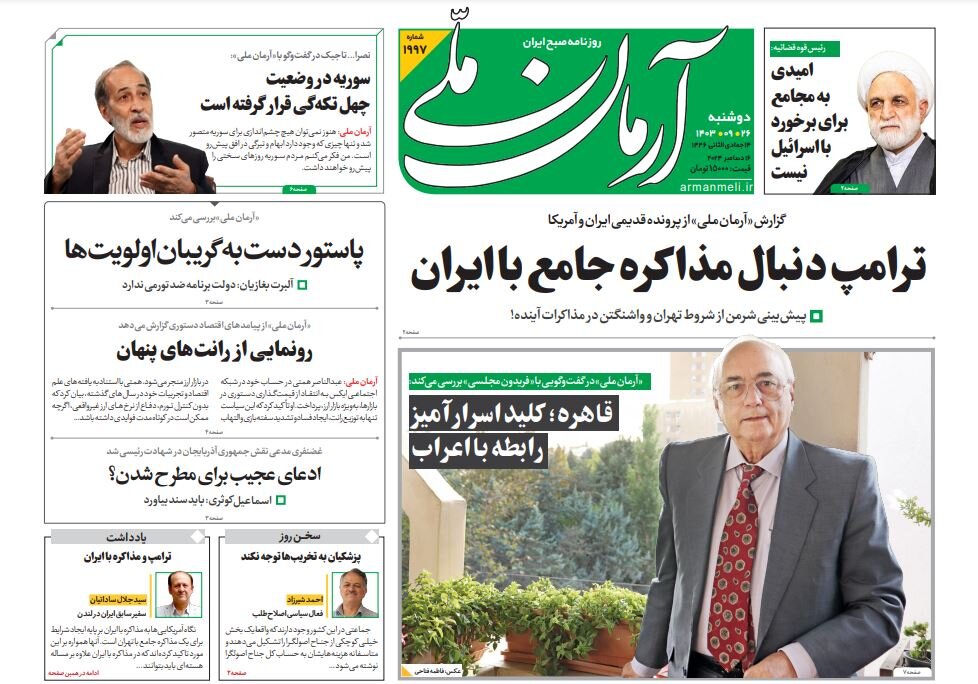Trigger mechanism is a leverage against Iran

TEHRAN - Arman-e-Melli interviewed Dr. Yousef Moulai, a professor of international law at Tehran University, to examine the various aspects of the trigger mechanism included in the 2015 nuclear deal, officially called the Joint Comprehensive Plan of Action (JCPOA).
He said: If the European countries concluded that Iran has not adhered to its nuclear commitments, they can refer Iran's nuclear case to the Security Council, and there will be a vote on it. The situation is not the same as in the past in which countries like Russia and China could play a special role and veto such a decision. As a result, an opponent (a JCPOA member) can fully invoke the trigger mechanism from the beginning to the end. The reports published by the International Atomic Energy Agency about Iran are negative and claim that Iran does not cooperate (with the IAEA). This issue can be a pretext for one of the European countries (Britain, Germany and France) to activate the trigger mechanism. It is not necessary to bring a special reason for this to happen, but if the current process continues, the activation of the trigger mechanism will be likely. (The trigger mechanism, set out in article 36 of the deal, involves the dispute being referred to a Joint Commission that will have a minimum of 15 days to resolve the issue.If the complainants are still not satisfied, they can refer the matter to the UN Security Council, which could vote to reimpose any sanctions lifted under the deal.)
Sobh-e-No: Netanyahu’s commotion against Iran
Sobh-e-No analyzed the Sunday telephone conversations between Netanyahu and President-elect Donald on Hamas, Hezbollah, and Iran. It wrote: Israeli Prime Minister Benjamin Netanyahu said on Sunday that he and US President-elect Donald Trump see "eye to eye on the Iranian threat". He also said, “I unequivocally declare to Hezbollah and to Iran: In order to prevent you from attacking us, we will continue to take action against you as necessary, in every arena and at all times.” Such remarks show that a new phase of commotion against the Islamic Republic has begun.
Jam-e-Jam: Axis of resistance is stronger than ever
In a note, Jam-e-Jam dismissed comments by media outlets that Iran is similar to Syria while it was under the leadership of Bashar al-Assad. It wrote: After the fall of Bashar al-Assad's government in Syria, efforts were made in media, mainly abroad, to lead the Iranian society towards despair by inducing the failure of the Axis of Resistance. The fact is that these types of inductions are completely based on wrong calculations. By inspiring such feelings some are trying to insinuate that the future of the Islamic Republic is the same as that of Syria. This is while there is no similarity between us and Syria. Iran's political and social conditions are not the same as Syria's. Iranians are not like the Syrians, who were involved in a multi-year civil war in recent years. Moreover, our armed forces are not similar to the Syrian army. Therefore, the media persons can answer these doubts by explaining differences.
Etemad: Iran should interact with new Syria
In an interview with Shoaib Bahman, a senior analyst of Eurasia affairs, Etemad discussed the developments in Syria and Tehran's foreign policy approach to the new situation in the country. He said: The developments in Syria happened so quickly that surprised analysts in international politics. Today we are witnessing a ‘new season’ in Syria, a season whose future is not clear. First, the composition of the leadership of this country should be determined, although the developments in Syria can affect the equations in the Middle East. Iran's foreign policy in the region is completely realistic. Of course, it cannot be out of this circle even in this sensitive situation. The fall of the Assad government has happened and today Syria is facing new conditions. Iran must come to terms with the realities of Syria and have a realistic view. That Iran wants to interact with the groups that take power in Syria is a completely realistic strategy.
Leave a Comment